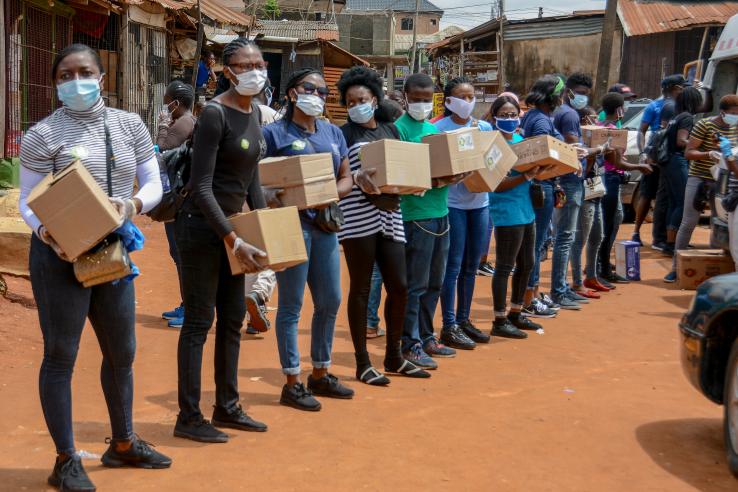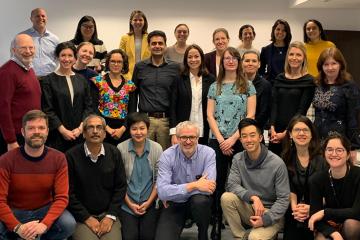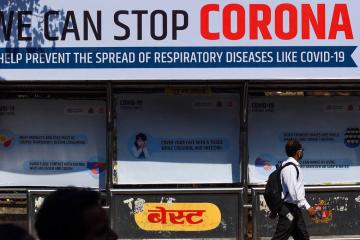
Covid-19-induced crises of hunger and poverty require bold, effective international response

This joint statement is released in cooperation with Innovations for Poverty Action, the Center for Effective Global Action, the Yale Research Initiative on Innovation & Scale, and the signatories listed at the bottom of this post.
As the Covid-19 pandemic crossed the threshold of two millions lives lost, the world remains at a precipice: though vaccinations are underway, the virus continues its spread. Just as urgent, economic crises are devastating the most marginalized populations around the world. The World Bank estimates between 119 and 124 million people fell into poverty in 2020 and, after consistently declining for nearly 25 years, extreme poverty is now increasing.
The Biden Administration has affirmed its commitment to work with other countries and multilateral institutions to combat Covid-19 to advance global health security. We commend this spirit of partnership and we urge similar bold, evidence-informed global action to tackle the accompanying crises of hunger and poverty.
When the pandemic hit, an international coalition of researchers joined forces to rapidly assess the socioeconomic effects of the first months of the health and economic crises in low- and middle-income countries. In interviewing over 30,000 people in nine countries in Asia, Africa, and Latin America, the team documented immediate and widespread drops in employment and income, and increases in food insecurity. Significant percentages of respondents across the surveys reported being forced to miss meals or reduce portion sizes, including 48 percent of rural Kenyan households, 69 percent of landless, agricultural households in Bangladesh, and 87 percent of rural households in Sierra Leone (the highest level across the samples). Across the 16 samples, between 8 and 87 percent of respondents reported a drop in income during the crisis period, with a typical country (median) at a staggering 70 percent.
Even with urgent action on vaccines, much of the global south will have to wait much longer—some potentially until 2024—before fully vaccinating their populations, and new variants may emerge when the virus is allowed to spread. Drawing on decades of rigorous evidence, we urge the international community, including governments, funders and multilateral organizations, to take the following actions to mitigate the crises of hunger and poverty:
- Address immediate poverty and hunger by deepening investment in cash assistance and food security.
Cash transfers have strong evidence of effectiveness across multiple contexts, and further evidence during the pandemic shows they boost food security and overall economic well-being for the poor. As of December 2020, 169 countries or territories have instituted cash transfer programs as a form of pandemic relief. Mobile money transfers are one delivery method option to radically scale this approach and advance financial inclusion, as many countries are providing more flexible measures to open a mobile money account and receive transfers. Still, more needs to be done to ensure mobile money reaches the poorest households.
In locations where domestic markets and supply chains have been severely disrupted and cash-based purchases are not feasible, supplying food aid can be a critical policy response to mitigate further food insecurity. Reinstituting school feeding programs, and even having schools serve as distribution points for food aid, is an immediate need: since the start of the pandemic, children have missed more than 39 billion in-school meals. Curbing food insecurity is particularly important for early childhood development—for example recent research in Ghana found that children that had experienced even brief spells without enough food on average had lower literacy, numeracy, and short-term memory. - Prioritize recovery strategies that address the protracted nature of the crisis.
While equipping households with the immediate assistance needed to weather the pandemic should form the cornerstone of response, governments should also fund programs to ensure recovery from crisis. For instance, at the household level, “graduation programs'' that provide assets and training can promote a source of livelihood that requires limited external contact, and these programs have boosted incomes and livelihoods across many contexts. In addition, small and medium enterprises have been especially devastated by the pandemic and should also be supported, as they account for 70 percent of formal jobs on average. Governments can ease liquidity constraints, provide debt relief, and assist with worker retention, among numerous other policies, to protect firms from further damages.
By centering its efforts on substantial continued economic support together with vaccine distribution, the international community can lay the groundwork for a long-term recovery. The economic fallout from the pandemic continues to imperil the livelihoods of the world’s most vulnerable. Insufficient action now will delay this recovery and widen inequality. The stakes could not be higher.
Joint statement signatories
Dennis Egger, University of California, Berkeley
Elliott Collins, Innovations for Poverty Action
C. Austin Davis, American University and Yale University
Günther Fink, University of Basel
Johannes Haushofer, Stockholm University
Dean Karlan, Northwestern University and Innovations for Poverty Action
Magdalena Larreboure, Busara Center
Salim Benhachmi, Yale University
Macartan Humphreys, WZB Berlin and Columbia University
Christopher Udry, Northwestern University
Shana Warren, Innovations for Poverty Action
Doug Parkerson, Innovations for Poverty Action
Paula Lopez-Pena, Yale University
Niccoló F. Meriggi, The International Growth Centre
Susan Athey, Stanford University
Maarten Voors, Wageningen University and Research
Ashish Shenoy, University of California, Davis
Michael Walker, University of California, Berkeley
Edward Miguel, University of California, Berkeley
Ahmed Mushfiq Mobarak, Yale University
Andrew Zeitlin, Georgetown University
Craig McIntosh, University of California, San Diego
Valentina Barca, Social Protection Approaches to Covid-19 Expert Advice
Paul Niehaus, University of California, San Diego
Laura Alfers, Rhodes University, South Africa
Elisabetta Aurino, Imperial College London
The Abdul Latif Jameel Poverty Action Lab (J-PAL)
Center for Effective Global Action (CEGA)
Innovations for Poverty Action (IPA)
International Growth Centre (IGC)
Yale Research Initiative on Innovation & Scale (Y-RISE)

